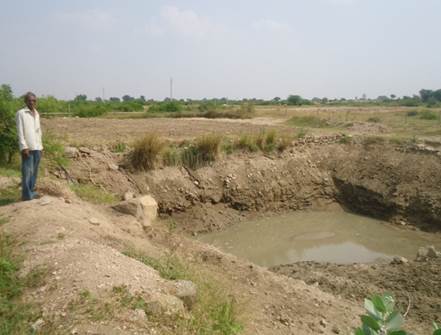|
Watershed Management helps
convert The watershed programme came as a participatory knowledge sharing platform for me when I became associated with it in 2011, says Ram Swaroop Gautam of Salya Pamar village situated in Datia district of Madhya Pradesh. In 2010, a watershed development project was
sanctioned for the micro-watershed
Ram Swaroop Gautam is one of the retired Patwaris of Datia district. Just before retirement in 2010, he purchased 8 acres of waste land at a price of Rs. 15000 per acre. He joined this watershed programme with an aim to enhance knowledge on different sustainable agricultural practices for converting his waste land into a well productive agricultural field. After completing the training sessions, he divided his 8 acres land in two parts - 6 acres for agricultural activities and another two acres for fishery. He arranged Rs 3.88 lakhs government subsidy for a tractor, a sprinkler set, a pump set and a pack house. A farm pond was dug using Rs. 1.5 lakh of government subsidy. Under the livelihood development training, he learnt about fish farming and decided to start fish farming in the same pond and expects to obtain fish worth at least Rs 20,000 every year. Apart from this, he has also done intercropping with gram for which he expects another Rs 12,000. In the year 2012, there was a 20% increase in crop yield profit of Rs. 6,000 from the same land by intercropping and reduced water use by use of improved varieties and other sustainable agri- practices. The next year he made an additional profit of Rs.12000 by growing groundnut, soya bean and rice in the Kharif season and Rs. 5000 by growing wheat, gram and pea in the Rabi season. A lot of positive changes have been seen in Ram Swaroop Gautamís life ever since he got associated with the watershed management programme. He has become more optimistic and admits that his life has changed for the better. Today he is a very active member of the village watershed committee promoting watershed activity in the region. q Sanghamitra Misra
|
 of Datia district under the Rajiv
Gandhi Watershed Mission (RGWM). This programme involves setting up
institutional mechanisms for community led watershed management,
delivers solutions focusing on sustainable agriculture, efficient
resource use, farmersí trainings for productivity enhancement and
livelihood diversification. Ram Swaroop Gautam attended training and
capacity building programmes where he learnt about off-farm and non-farm
income generation activities and trained on sustainable agri-practices
and water use efficiency.
of Datia district under the Rajiv
Gandhi Watershed Mission (RGWM). This programme involves setting up
institutional mechanisms for community led watershed management,
delivers solutions focusing on sustainable agriculture, efficient
resource use, farmersí trainings for productivity enhancement and
livelihood diversification. Ram Swaroop Gautam attended training and
capacity building programmes where he learnt about off-farm and non-farm
income generation activities and trained on sustainable agri-practices
and water use efficiency.